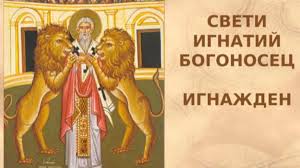According to the proto-Bulgarian calendar, this is the single day, which is not included in any of the months. It is considered the beginning of the new year. The day marks the winter solstice, when the day is shortest and the night is longest. In the distant past, this astronomical phenomenon occurred around December 20. In 2023, the winter solstice falls on December 22. The holiday should be movable, but since it is not, the people today consider December 20 as Ignazhden - the day when the first guest determines what the year will be.
In Northern Bulgaria, Saint Ignatius' day is called Ignazhden, Idinak (Edinak). In southern Bulgaria, this holiday is called Idignazhden, Ignatiovden (Rhodopes) and Polaz or Polyazovden (Kotlensko). But the holiday is celebrated all over the country. The most important thing of the day is who will enter the house first. This first visitor is called a visitor. If the pilgrim is a man of property, honest and honorable, he and the year will be like that for the owners. If a girl visits a foreign home first, there will be more female animals during the year.
Before entering the house, the pilgrim collects boards and wood chips that are around the wood in the yard and puts them in the hearth. Then he sits down and starts imitating the chirping of a chicken. During this time, I also dig up the fire, and the goal is to have more sparks. The cook stirs the fire and calls: "As many sparks in this fire, as many chickens, lambs, kids, calves and piglets in this house!" "in this house". Somewhere, the hostess hands him the sieve and seeds and the pilgrim must ritually plow the land and call for fertility. And the owners treat the important guest with wine and brandy and the specially prepared "Ignazhdenski kravai". While kneading the cow, the women tear off some of the dough, make crosses as many as there are family members and stick them on a beam to protect them from evil. Whoever is the first to leave the house on that day, when he returns, must bring sticks for the fire. Since, according to church beliefs, the birth pains of the Mother of God begin on this day, women on Ignazhden do not do any housework. This ban applies especially to young brides and grooms. By observing the day, women will conceive and give birth with less pain. At sunrise, the women clean the chimneys and throw away the soot with the broom. The new year begins, and the broom, as an important attribute of the housewife and a means of any kind of cleaning, must also be new. To protect well-being and fertility, housewives sprinkle ashes from the hearth around the house or smoked wheat. If after that the year was good, the farmers invite the same polasnik next year.
You can read more about holidays and customs in the collection:
Folklore collection "Once upon a time - manners and worldview of the Bulgarians"
And in Loveshko, if the girl wants to know who she will marry, she goes to the woodcutter. Then he sits on it and sprinkles himself with barley and calls: "Whoever is lucky for me to come tonight and get married together!". Then he gets up and takes wood chips in one hand and barley in the other and enters the house. He leaves the cod by the hearth, and puts the barley under his pillow. He who dreams at night will marry him.
Folk beliefs related to the holiday:
- If the weather is clear on Ignazhden, there will be a drought in April.
- If it rains, there will be rains and fertility in April.
- It is good if it snows on Epiphany and also on Christmas.
- If on Ignazhden the weather is cloudy, the harvest will be good and there will be abundance in the beehives.
- The weather for the next 12 days of the month - from December 20 to 31 - shows the weather for the 12 months of the coming year. December 20 determines what the weather will be like in January.
- Nothing should be taken out of the house - especially fire, embers or salt - so that the blessing does not come out.
- Nothing is asked for or lent.
- Do not get up from the table while eating, because the hens will not brood. You don't go out into the yard to make the hens fuss anymore.
- Do not sew or knit, so that the intestines of the hens do not get tangled and they lay.
- Don't boil beans to avoid hail.
- Do not wash to prevent disease.
- It is not good if a child is conceived on Ignazhden, because it will be born with a disability.
- Pregnant and nulliparous women do not have to work to give birth easily.
- Do not move hives, otherwise the bees will flee.
- Men do not harness cattle to keep them healthy and agile throughout the year.
On this day, the church honors the memory of Saint Ignatius the God-bearer. Born in the 2nd century, Ignatius was one of the disciples of John the Theologian. He occupied the archbishopric chair of the city of Antioch. And like most of his brethren of the early Christian era, Ignatius died a martyr for the faith. It was torn apart by wild beasts on the stage of the Colosseum during the time of Emperor Trajan Decius (249-251).

